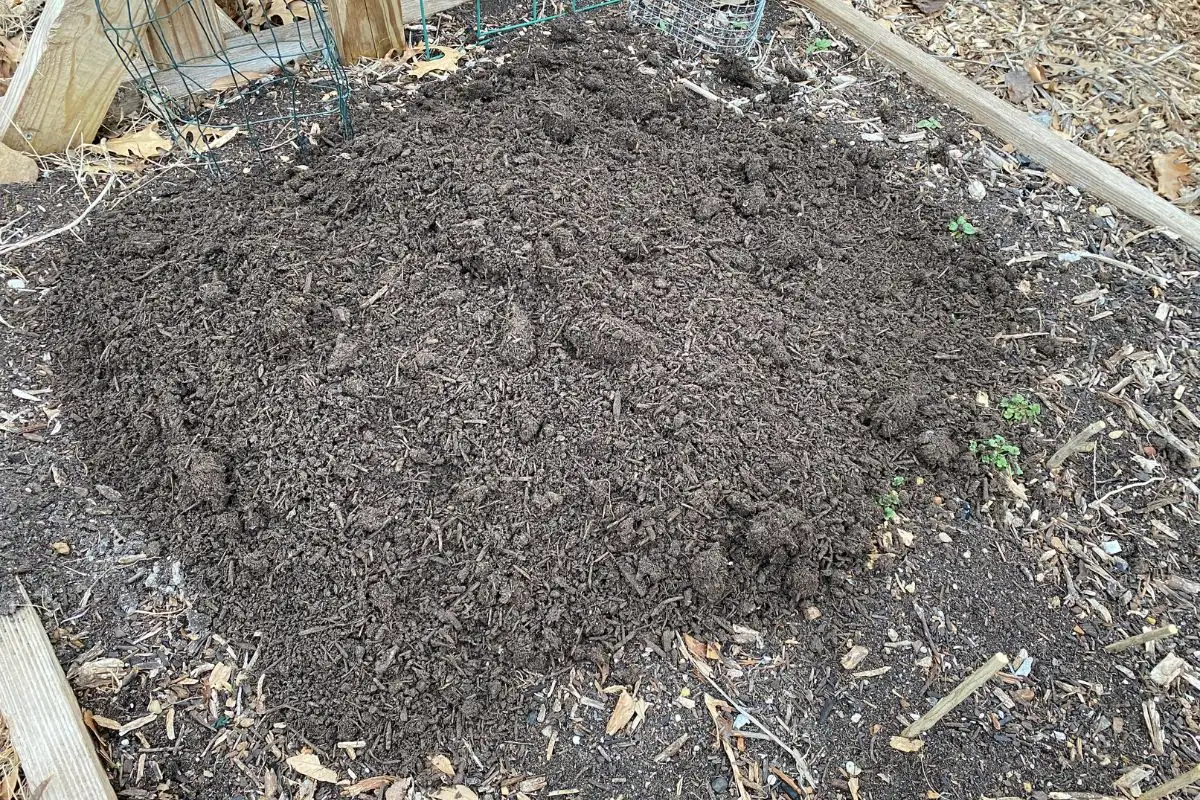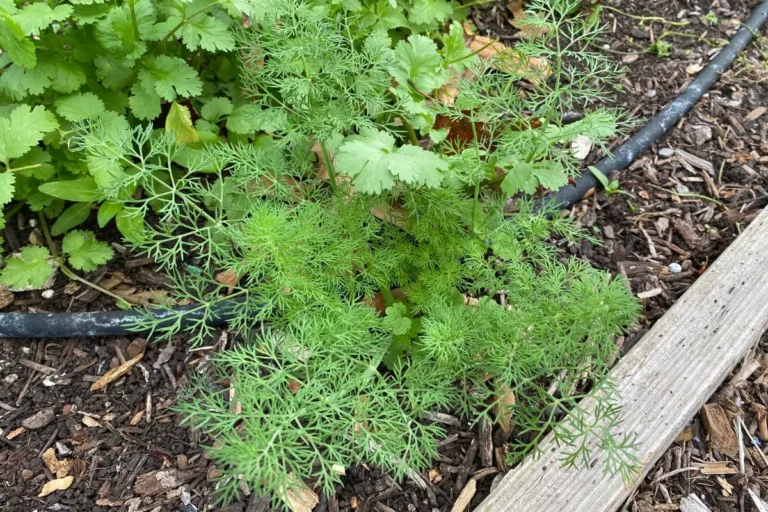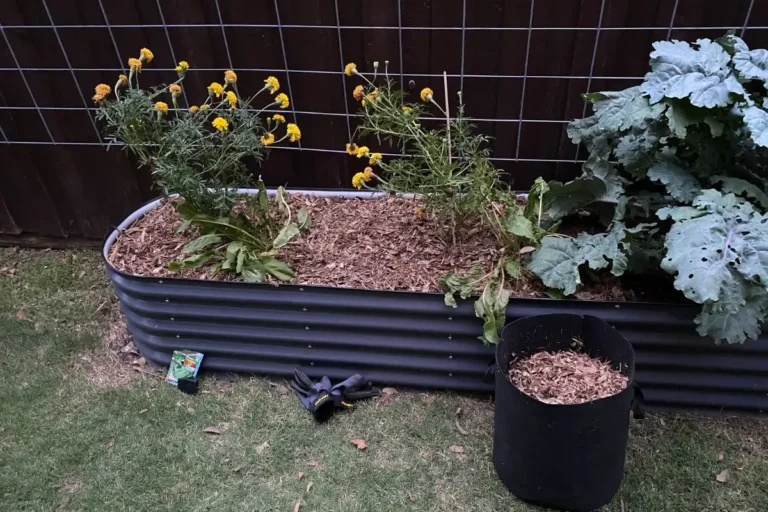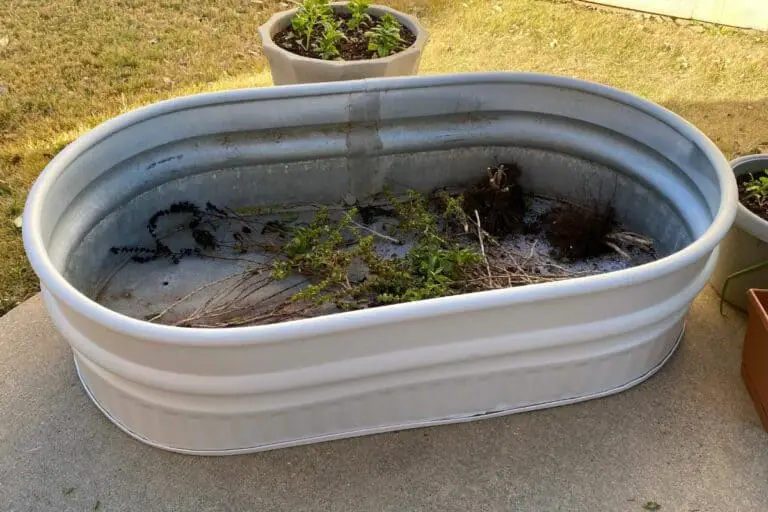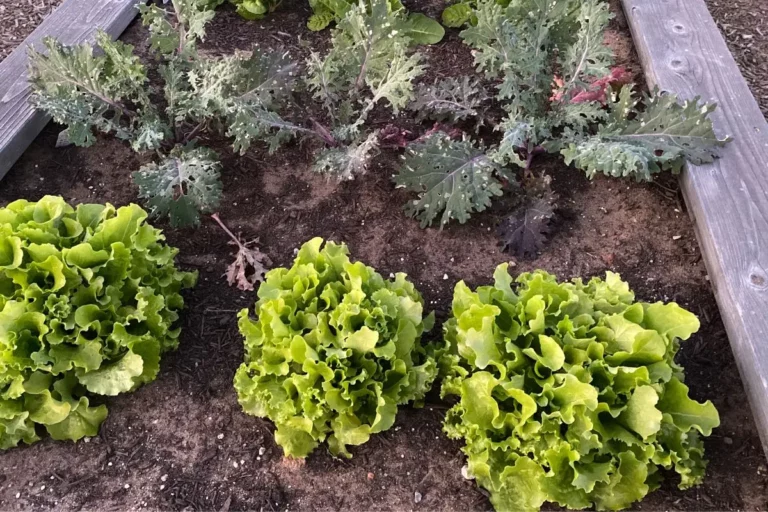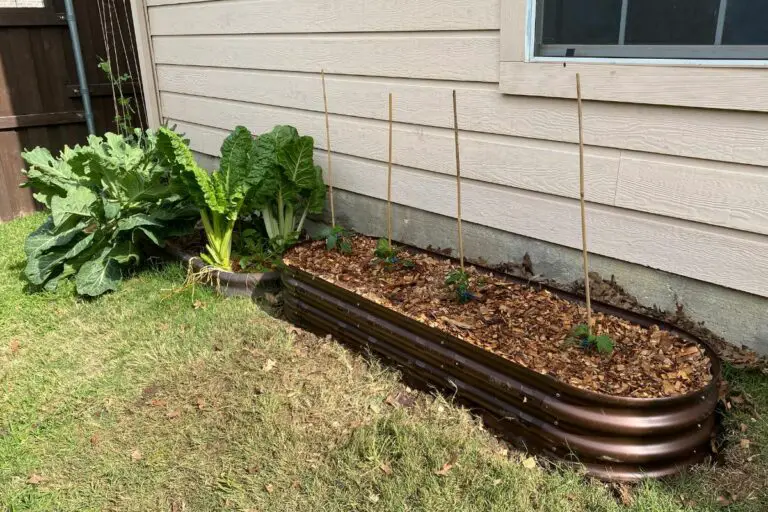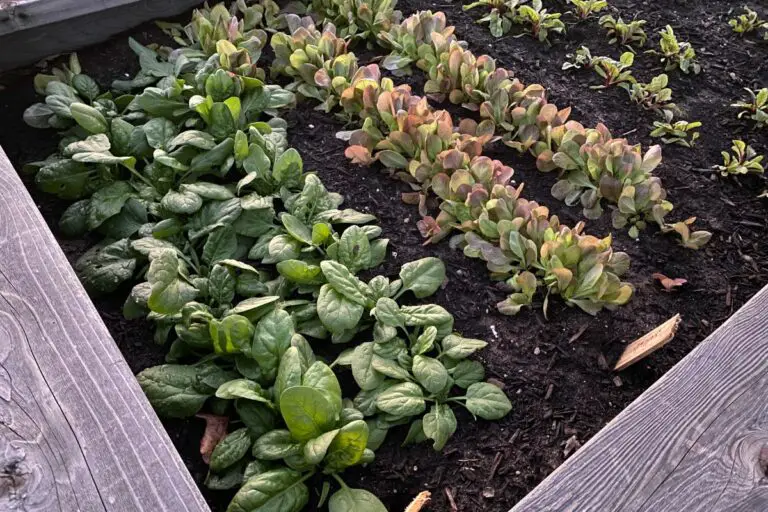Do Raised Beds Need Yearly Compost? (Here’s What to Do)
If you’re a beginning gardener or someone with a bit more experience under their belt, you’ve likely heard about the benefits of raised bed gardening.
But when it comes to managing your raised beds, you might be wondering about when, how, and how often to add compost. Should you add it to your raised beds each year?
Annual compost additions to your raised garden beds can provide numerous benefits, including improved soil structure and fertility, efficient nutrient recycling, effective weed suppression, natural pest management, and better drainage.
These factors can contribute significantly to the overall health and productivity of your garden plants, so in this article, I’ll explore the advantages and potential drawbacks of adding compost to your beds each year, helping you make informed decisions about your garden’s unique needs.
Here’s what I’ll cover in more detail below:
- reasons why you might want to add compost to your garden each year.
- a few reasons why you might not need to do so.
- some important tips concerning soil testing.
- recommendations for when and how to add compost to your raised beds.
But please keep this in mind: What works well for one gardener might not be the best approach for another.
That’s why I’ll dive into the pros and cons of adding compost to raised beds each year, as well as discuss various factors to consider when diagnosing the health of your soil.
By the end of this article, you’ll be better equipped to cultivate healthy plants in your raised beds, no matter your level of gardening experience!
Do Raised Beds Need Compost Every Year?
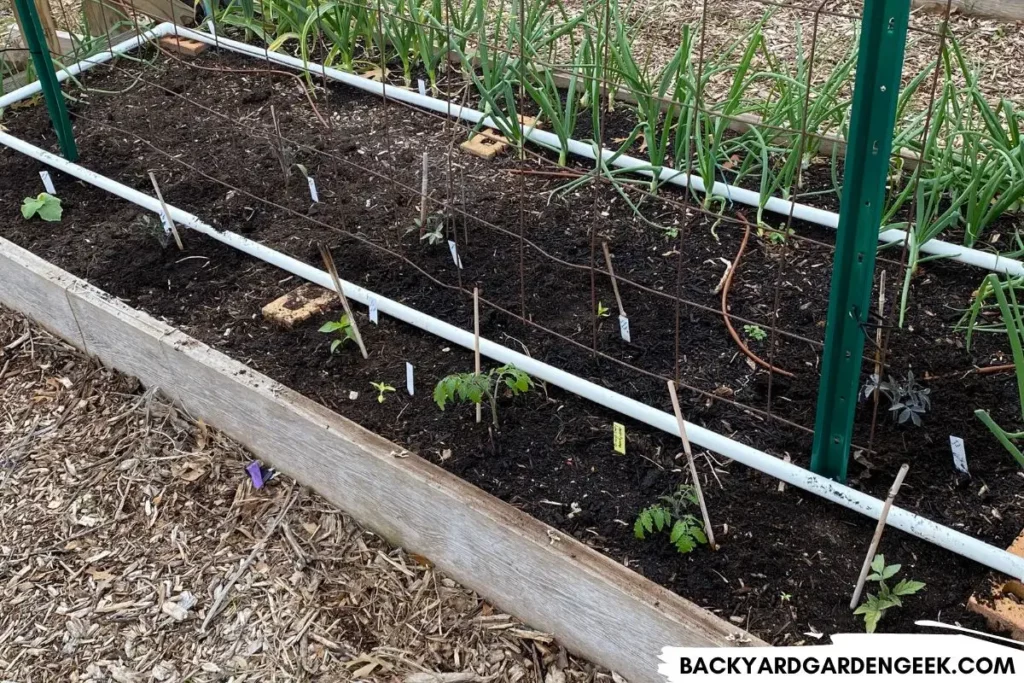
Let’s start by looking at the many reasons why annual compost applications can do wonders for the soil in your raised beds:
| Soil Structure | Adding compost on a yearly basis can help to improve the overall soil structure in your raised beds. This will help with air circulation and water retention since the compost will enrich the soil over time. |
| Nutrient Recycling | As time goes on, your raised beds will benefit from the breakdown of organic matter and the release of nutrients into the soil. Compost helps this process along and thus contributes to soil fertility. |
| Weed Suppression | One of my favorite reasons to add a layer of compost is the fact that that’ll help with weeds. By covering your soil in additional nutrient-rich materials, you’ll smother weed seeds while helping your plants out. |
| Pest Management | Healthy plants are able to withstand pest attacks better than unhealthy plants. Homemade compost in particular will introduce nutrients and microorganisms to your raised beds, which will help your plants and thus contribute to their natural self-defense mechanisms. |
| Drainage Improvement | If you’re got terrible native soil on your property, raised beds are a must, and compost (when incorporated into the raised bed) will contribute to better drainage over time. |
Adding compost to your raised beds on a yearly basis can contribute to healthier, more productive plants since it’ll enhance your soil, increase available nutrients, suppress weeds, and generally help your plants thrive, especially in times of stress.
While adding compost on an annual basis can be beneficial in the long run, there are certain situations where you might not need to do so.
Let’s take a look at several of those below:
| Sufficient Soil Levels | If your raised beds are filled with soil and your plants are thriving, you might not need to add any compost this year. But if you notice any soil compaction, you’ll want to add some compost when you get a chance. |
| Slower Decomposition | In colder areas or raised beds with lower microbial activity, you might notice that organic matter in your beds seems to decompose more slowly than expected. You probably only need to add compost every 2-3 years if this is the case for you. |
| Nutrient-Rich Soil | If your plants are thriving, you’ve likely already got nutrient-rich soil in your raised beds. I wouldn’t add compost if that’s the case, just a nice layer of mulch to protect the soil and keep weed seeds suppressed. |
| Alternative Amendments | Compost is not the only thing you can add to raised beds. If you’re growing cover crops, adding any kinds of fertilizer, or mulching your beds heavily, you might not need additional compost. |
| Existing Plants | If you’ve got plants in your raised beds with established root systems, you might want to think twice before adding lots of compost. Apply some as a top dressing and wait until your plants have reached the end of their life, then pull the plants and add lots of compost as needed. |
| Space Constraints | If you’ve got small raised beds on your property, you might not have the space to add much compost since the soil levels will rise each time you do. You can always remove some soil, then replace with compost, or you can add fertilizer if your plants are lacking nutrients. |
There are many reasons why your raised beds might benefit from regular compost applications but also some reasons why you might not need to do so.
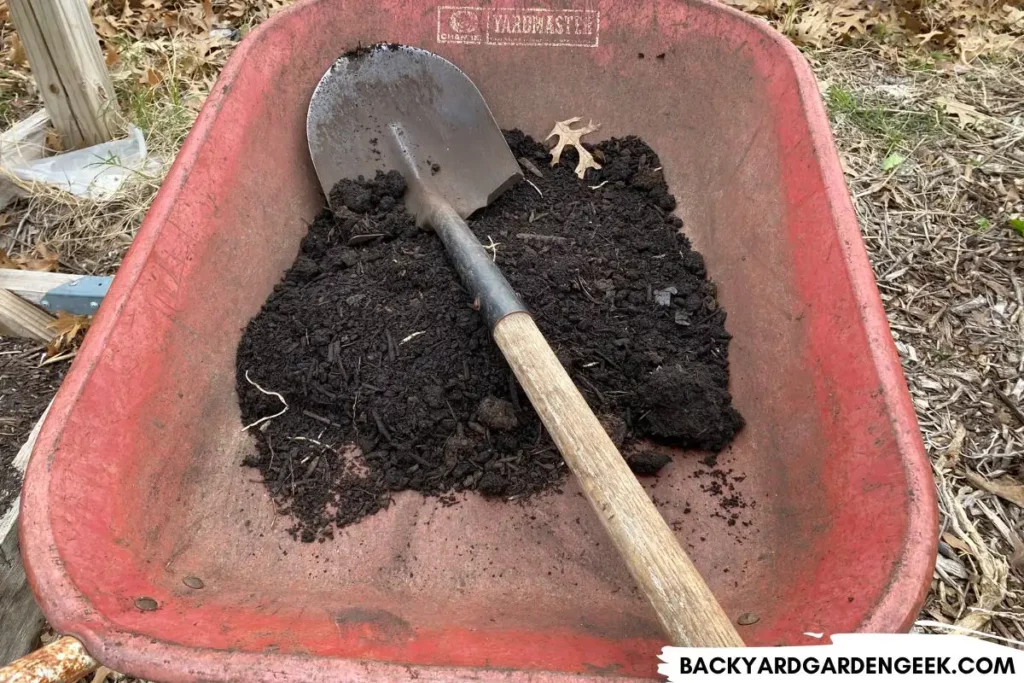
Before you do anything to your raised beds, I’d encourage you to keep reading since I’d like to share a few important points about soil testing, compost quality, and amendment methods.
That way, you’ll be able to make informed decisions about your compost application schedule and ensure that the conditions are right for your plants to thrive this year!
Want some helpful information about gardening in raised beds? You can open these articles in a new tab, then read them once you’re done learning about compost:
- 12 Reasons Why Vegetables Can Grow Better in Raised Beds
- Drainage 101: Drilling Holes in Raised Beds and Containers
- How Deep Should Raised Garden Beds Be for Tomatoes?
- Pros and Cons of Raised Garden Beds: Know Before You Grow!
- Top 10 Reasons Why Concrete Blocks Are Good for Raised Garden Beds
Amending Your Raised Beds (Be Sure to Do This!)
A few years back, my father was struggling with plants that just wouldn’t grow well in his raised beds. No matter what he tried, they seemed stunted and unhealthy.
Before recommending anything, I suggested that he send a soil sample to the Texas A&M University Extension Office to learn more about what was going on in his soil.
When the results came back a few weeks later, we weren’t entirely surprised to learn that his soil had a severe nitrogen deficiency. The good news was that we now had a game plan in mind to amend his soil so that his plants would have plenty of access to nitrogen.
In other words, it’s tough to know what to do to help your plants if you don’t understand what’s happening beneath the surface of the soil.
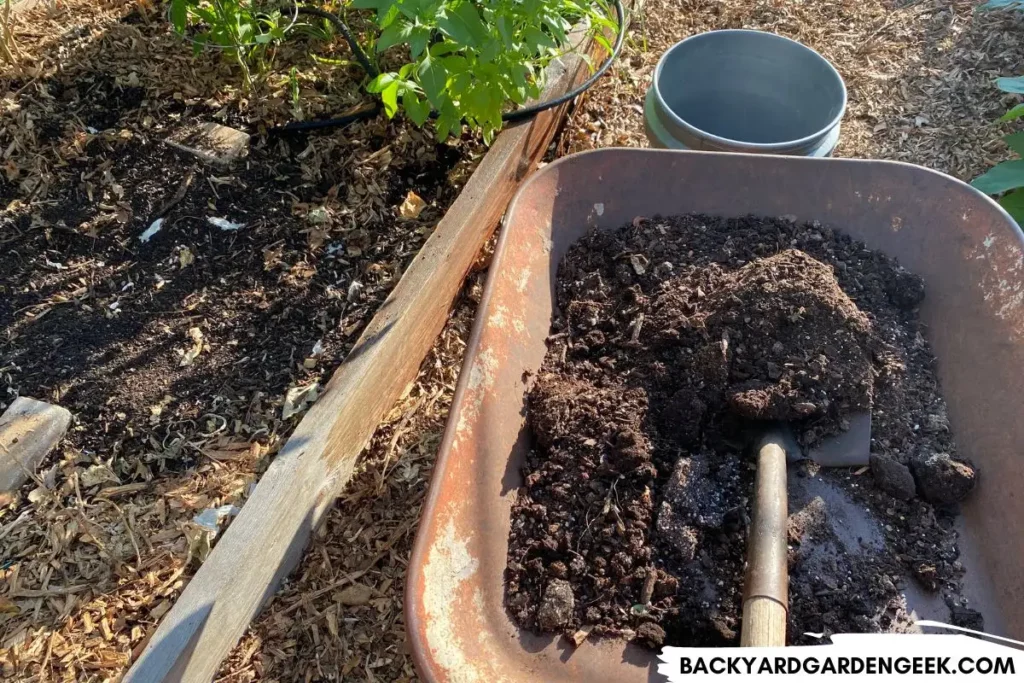
If you’ve never gotten a soil test done, I’d encourage you to do so once every 4-5 years since those tests provide invaluable insights about the nutrient and pH levels in your soil.
With that information, you’ll be able to make informed decisions about compost additions and other soil amendments that might be necessary to keep your garden thriving. Soil tests can also help you avoid over-fertilizing or under-fertilizing your plants, both of which can lead to poor plant growth.
When it comes to adding compost to your raised beds, you’ll notice a huge difference between homegrown compost and store-bought compost. Here’s why:
- Homegrown compost is made up of your kitchen scraps and yard waste, once they’ve been left to decompose for many months at a time. Like bagged compost, it’ll contain lots of nutrients, but unlike bagged compost, you’ll also find countless microorganisms (and even earthworms) when you scoop it out of your compost bin, which is a huge boon for your raised beds.
- Bagged compost is fine in terms of its nutrient makeup, making it great for raised bed amendments, but you won’t find any wonderful earthworms or other organisms crawling around in there.
Whichever you end up choosing, you’ll want to ensure that your compost is mature and high-quality to provide the most benefits for your raised beds.m
In addition to compost, you might need to add fertilizer amendments if your soil test reveals any nutrient deficiencies or pH imbalances. This is why soil tests are so important. You don’t want to randomly add fertilizer if you don’t understand what’s going on in your soil.
Fertilizer amendments can be mixed into the compost prior to application, helping to address specific nutrient needs and create a more balanced growing environment for your plants. This targeted approach can make a significant difference in the overall health and productivity of your garden.
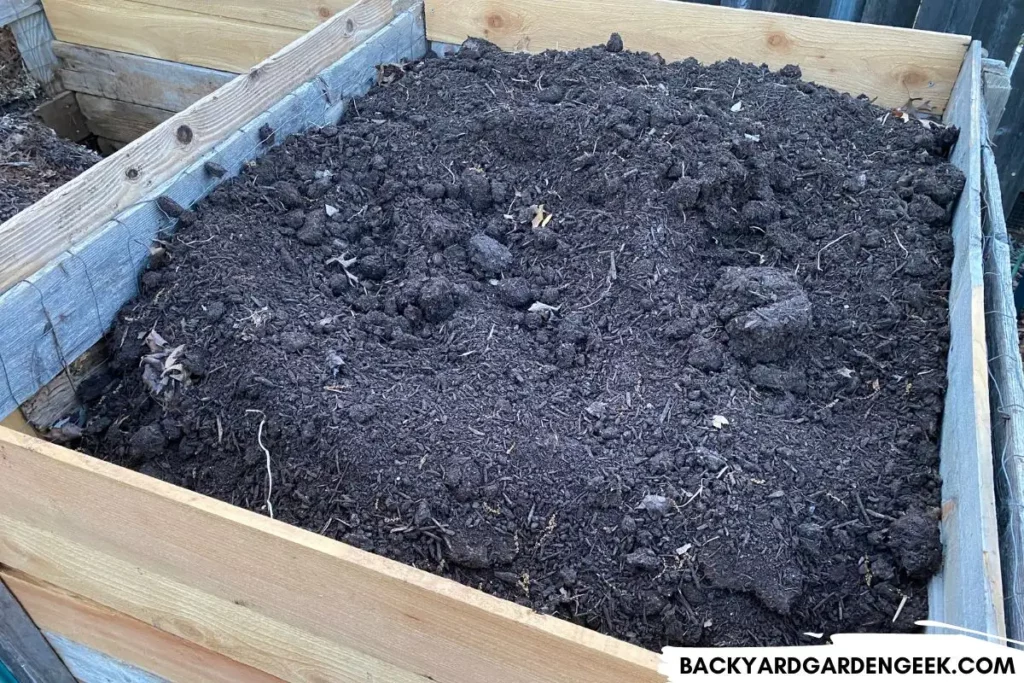
Take a look at these articles for more tips and recommendations:
- 23 Plants You Shouldn’t Grow in Raised Beds
- Can You Put Bark or Mulch in the Bottom of a Raised Bed?
- Full Sun or Partial Shade: What’s Best for Raised Beds?
- Putting Raised Beds on the Patio: Should You Do It?
- Sloping or Uneven Ground? Give Raised Beds a Try
- Using Topsoil in Raised Garden Beds: Can You Do It?
Now let’s turn back to compost because I’d like to share a few things with you about timing.
If you’re planning to amend your raised beds with compost, you can do so at different times of the year, but you’ll want to plan accordingly:
| Late Fall | This is a great time to add compost, but you’ll want to make sure you’re not smothering any fall plants that are still growing in your beds. If your plants are still going strong, add 1-2 inches of compost to the bed and wait for a later time to add any more. |
| Early Winter | If you live in a region that experiences lots of winter snowfall, you’ll want to amend your beds with compost before the snow hits. That way, the compost will have a few months to sit atop your soil, waiting for spring to arrive. |
| Early Spring | This is a fantastic time to add compost, especially if you haven’t yet put any plants in your raised beds. That way, you’ll have plenty of flexibility to lay down the compost, mix it in, or spread it evenly across the surface. Just make sure that any compost added in early spring is well-aged and ready for use. |
Whenever you add the compost, just make sure to do so before planting so that you give the compost a head start in terms of its nutrient-enriching processes.
When it comes to incorporating compost into your raised beds, you can incorporate the compost in a few different ways:
Sheet Mulching
Sometimes referred to as lasagna gardening, sheet composting, or even hugelkultur, sheet mulching involves placing layers in your garden, which allows each layer to decompose and provide nutritional benefits for your plants.
When it comes to compost, you can do something similar, especially if your raised beds need more materials added to them.
Here’s what you do if you’ve got room to spare:
- Leave your soil untouched and simply lay down a thin layer of compost atop the soil (1-2 inches).
- If you’ve got more garden soil available, you can layer this atop the compost.
- You can even put down another layer of compost if there’s still room to do so.
- Finally, cover everything with a nice 1-2 inch layer of mulch.
Over time, these layers are going to break down further and help contribute to more nutrient-rich, well-draining soil.
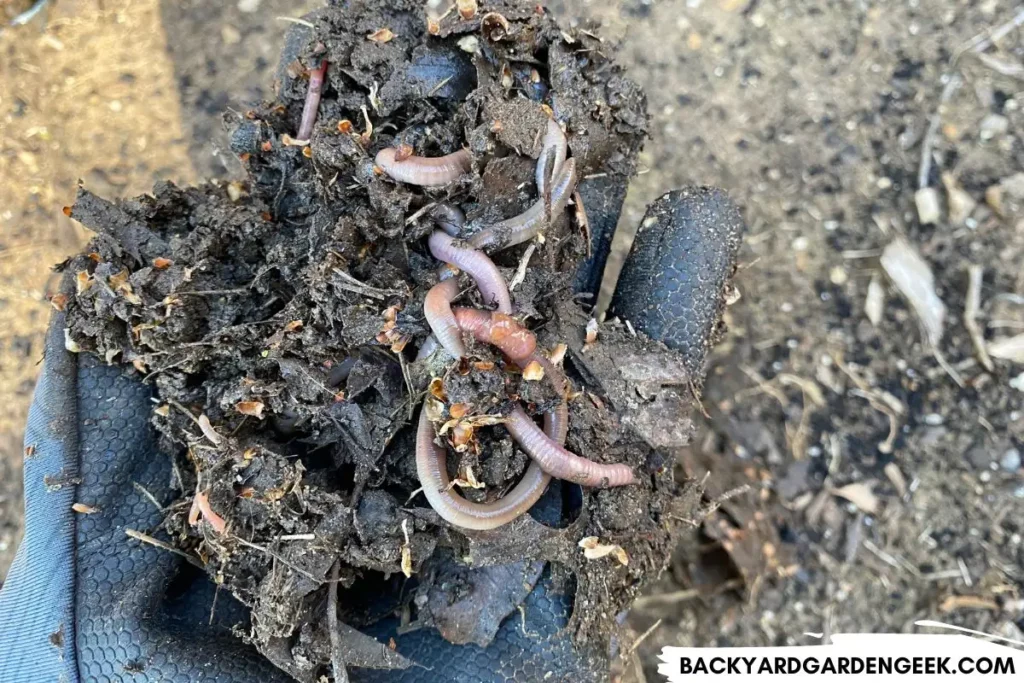
This no-dig approach to composting is ideal for improving soil fertility without disturbing any existing soil as well as the earthworms and microorganisms that live down there.
Top Dressing
If you’ve got established plants in your raised beds, you don’t want to do layering. Instead, you should consider applying compost as a top dressing.
This is literally the easiest way to add compost to a raised bed, and it’s what I do most years since it’s simple yet effective.
Simply spread a layer of compost around the base of your plants, being careful not to smother the stems. This method allows nutrients to gradually leach into the soil, feeding your plants while minimizing root disturbance.
I shovel compost into the bed, then use my hands to level it and smooth it around, making sure I add as much as possible without damaging any of my plants.
Incorporating Compost
If you’re installing raised beds for the first time–or if you haven’t yet planted anything in them–you can incorporate compost directly into the soil, although proponents of no-dig gardening might not practice this approach.
Here’s what you do: Turn the compost into the top 6-8 inches of soil, mixing it thoroughly to ensure that it mixes well with the current soil.
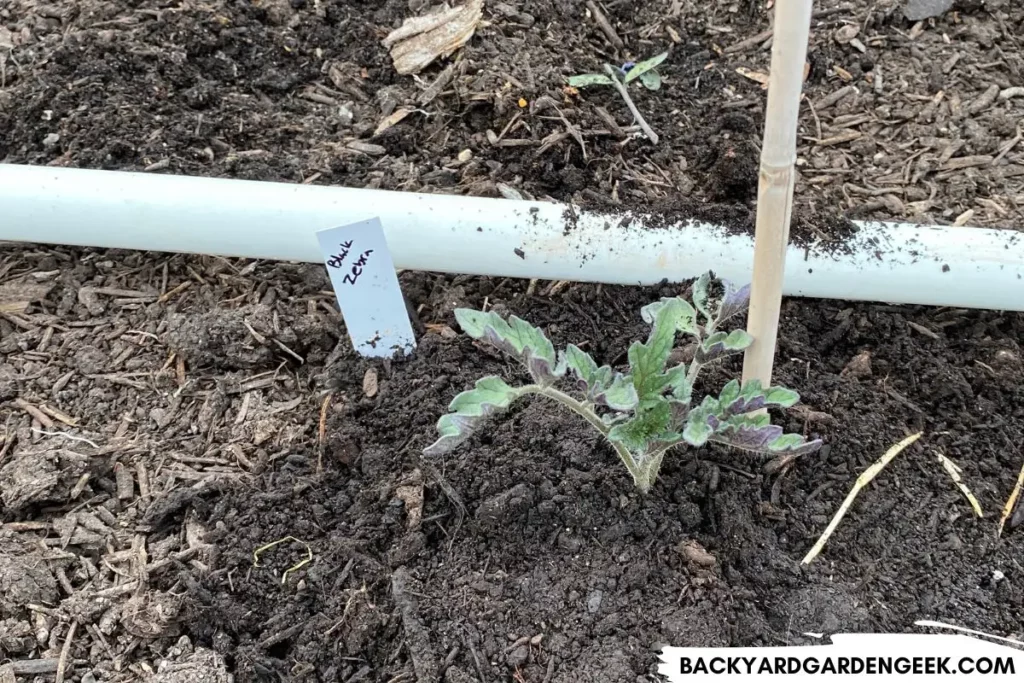
This method can be particularly effective for improving soil structure if you’ve found that your raised beds have gotten too compact over time.
Just be sure to lay down cardboard if you’re building or installing new raised beds. I’m not a fan of putting landscape fabric under raised beds because it won’t break down. I prefer to put lots of compostable materials in the bottom of my raised beds, then use the hugelkultur method to save as much money as possible on soil.
If you’d like to learn more about my experiences with raised bed gardening, check out these articles:
- 9 Easy Steps to Build Raised Garden Beds on Your Grass Lawn
- 32 Must-Try Vegetables for Your Raised Garden Beds
- Filling Raised Beds with Just Compost: Should You Do It?
- Growing Plants in Cinder Block Holes: A Step-by-Step Guide
- Should You Remove Grass Under Raised Beds?
Compost Tea
This particular method is more time-intensive, but if you’ve got a compost pile on your property and the patience to do the work, compost tea is just about as good as it gets when it comes to amending your raised beds.
Simply put, it’ll give your plants a quick boost of nutrients since this is a liquid fertilizer that’s made by steeping your compost in water, then applying it to your raised beds as a foliar spray (if you’ve got plants growing there) or as a soil drench.
Whether you’re adding compost to your raised beds or not, please keep an eye on your plants’ health during the growing season and act quickly if you notice signs of diseased leaves, stunted growth, or weak plants.
Monitoring your garden and adjusting your compost application techniques can help ensure the ongoing health of your raised beds.
Before I wrap things up, I want to share one more piece of advice concerning compost purchases:
As you plan your compost applications, remember that purchasing compost in bulk can be a very cost-effective option.
Bulk compost is always cheaper than bagged compost…much, much cheaper.
Bagged compost typically comes in 1 cubic foot bags, and each bag will cost you $5-6. But if you buy a cubic yard of compost in bulk (which equals roughly 27 bags), you might only spend $45-60. That’s a huge savings!
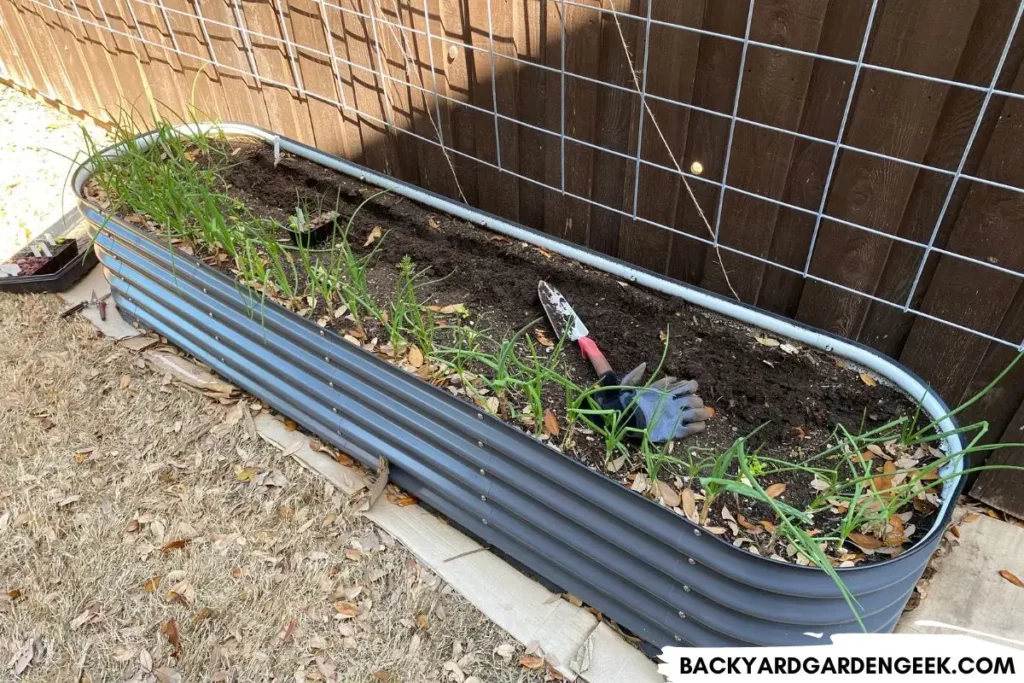
However, be sure to source your bulk compost from a reputable company to ensure you receive a high-quality product. Look for local suppliers with positive reviews and check with other gardeners in your area to see what they recommend.
Many suppliers require a minimum order for delivery (often 2-3 cubic yards), so I’d suggest teaming up with a friend or neighbor who can help you meet the minimum requirements while still enjoying the cost savings of bulk purchases.
Long story short, compost is not a solution to all soil-related problems (only a soil test will tell you what you need to know!), but adding compost to your raised beds each year can often lay the groundwork for healthy, nutrient-rich soil that’ll help your plants do their best.
Further Reading
Want to learn more about raised bed gardening? Check out these articles to get a good sense of what I’ve done over the years in terms of raised garden beds:
